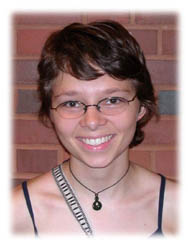| EN170 Haiku Writing Roundtable Dr. Randy Brooks Millikin University • Fall 2004 |
|
|
tearing
|
|
Reader's Response
This haiku strikes me at my very soul. The feeling I get upon reading it is one of loneliness—and not so much from the word "lonely" but actually more from the first line. It seems that he is deliberately hiking ahead of her . . . or is she deliberately hiking behind him? This is a question that could only be answered by the haiku writer. Whichever it may be, however, I do feel the need to clarify that it is not loneliness in a bad sense—it is more independence and calm. Some of the best moments I have had in life could be described as lonely, as I do not feel that loneliness has to be a bad feeling. The beautiful image that this haiku brings to my mind makes me with that I were there to have experienced that moment.
I love this haiku because of the simple truth that it speaks. It does not describe something rare or unusual, but rather something that anyone could witness on any given day in any place. In that sense, I find this haiku's brilliance. Not many people take time to notice "little things" these days—we are all too busy scurrying about our so-called "busy" lives. The fact alone that Emily Evans takes the time to appreciate all aspects of life enough to even notice this situation shows me that she is truly a great person . . . and the fact that she can capture the moment so well in so few words shows that she is also a truly great writer. —Jenn Van Natta |
|
|
back from summer |
|
after class |
|
our front yard tree |
|
i shove things in closets |
|
on the bench |
|
sleeping in |
|
stirring the compost |
|
watching him |
|
sitting still |
|
tearing lettuce |
|
san francisco |
|
our last phone call |
|
thanksgiving day |
|
garage sale: |
|
hiking ahead |
|
searching the airport |
|
peeing behind a bush |
|
making dinner |
|
simple tea bowl |
©2004 Randy Brooks, Millikin University, Decatur, Illinois || all rights reserved for original authors
